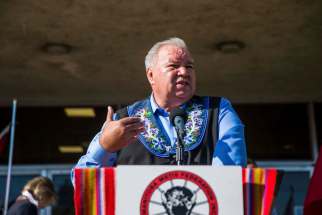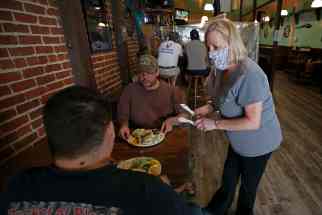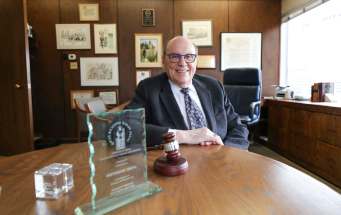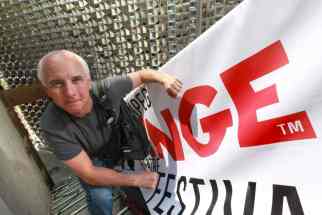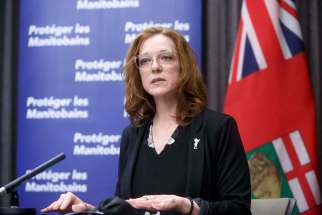Métis leader will personally ask Pope for apology David Chartrand among delegates making papal visit to discuss residential schools
Read this article for free:
or
Already have an account? Log in here »
To continue reading, please subscribe:
Monthly Digital Subscription
$0 for the first 4 weeks*
- Enjoy unlimited reading on winnipegfreepress.com
- Read the E-Edition, our digital replica newspaper
- Access News Break, our award-winning app
- Play interactive puzzles
*No charge for 4 weeks then price increases to the regular rate of $19.00 plus GST every four weeks. Offer available to new and qualified returning subscribers only. Cancel any time.
Monthly Digital Subscription
$4.75/week*
- Enjoy unlimited reading on winnipegfreepress.com
- Read the E-Edition, our digital replica newspaper
- Access News Break, our award-winning app
- Play interactive puzzles
*Billed as $19 plus GST every four weeks. Cancel any time.
To continue reading, please subscribe:
Add Free Press access to your Brandon Sun subscription for only an additional
$1 for the first 4 weeks*
*Your next subscription payment will increase by $1.00 and you will be charged $16.99 plus GST for four weeks. After four weeks, your payment will increase to $23.99 plus GST every four weeks.
Read unlimited articles for free today:
or
Already have an account? Log in here »
Hey there, time traveller!
This article was published 29/06/2021 (1626 days ago), so information in it may no longer be current.
OTTAWA — The head of the Manitoba Metis Federation is headed to Rome this December to ask the Pope to come to Canada to apologize for residential and day schools — and start a renewed relationship between the Catholic Church and Métis communities.
“I’m sure it would be a great opportunity for the healing to start,” federation president David Chartrand told the Free Press.
Chartrand will be part of a series of delegations of First Nations, Inuit and Métis leaders. The plan is for the three Indigenous groups to separately visit Pope Francis at the Holy See between Dec. 17 and 20, and conclude with a papal audience together.
All three groups will be seeking an official apology in Canada for the Roman Catholic Church’s role in residential schools, as well as other institutions Indigenous children were forced to attend, such as day schools.

The Catholic Church operated more than half of all residential schools in Canada and, unlike other denominations, has held back on providing records, funding survivor programs and making a formal apology.
Canadian bishops have been planning a Vatican visit for the three main Indigenous organizations — the Assembly of First Nations, the Métis National Council and Inuit Tapiriit Kanatami — since before the pandemic.
In a statement, the bishops said residential school survivors and knowledge keepers will meet with the Pope, who will “address the impact of colonization and the implication of the Church in the residential schools.”
Chartrand said the dates were coming into focus just before the revelation of 215 unmarked graves at a former residential school in Kamloops, B.C., set off a national discussion, which he hopes will nudge the Pope to come to Canada.
“Maybe it was meant to be,” he said.
“I’m sure it would be a great opportunity for the healing to start.”
– MMF president David Chartrand
Métis communities tend to have strong ties with the Catholic Church, despite its role in colonization.
Before its dissolution, the Red River Colony in what is now Winnipeg formed a distinct Métis culture, whose language, religion and culture stem from local Cree and Anishinaabe traditions as well as French-speaking settlers, which for many included adopting the Catholic faith.
Chartrand said the Métis National Council will take eight delegates from across the Prairies, including elders and young people; the delegation also hopes to include government officials and media.
“We need to go there to bring our message, but we also need to bring back the Pope’s message,” he said.
“This pilgrimage will be very important.”
Chartrand said he’ll present the Holy Father with a gift on behalf of the Métis nation, likely involving beading, and ask for a few things, especially for him to come to Canada to apologize.

“Imagine him coming to the soil, to the land that we own, and knowing that this happened in these lands,” he said.
“It would be such a powerful statement, coming right from the Vatican and right from the Pope himself.”
Chartrand went to a Catholic day school run by nuns in the 1960s, where he recalled them mocking his long hair. They once used a stick and elastics to tie his hair straight up in a ponytail, leaving it for a few hours before chopping it off.
Métis get carbon-tax cash to retrofit headquarters
OTTAWA — The Manitoba Metis Federation is getting $3.5 million in carbon-tax payments to improve the environmental footprint of its Henry Avenue headquarters.
MMF president David Chartrand said the organization is putting up $1.5 million of its own cash to retrofit its 100,000-square-foot headquarters, including such improvements as less drafty windows, solar panels, new furnaces and air conditioning.
Winnipeg South Liberal MP Terry Duguid announced Ottawa’s contribution Tuesday, alongside $1.5 million in federal funds for Métis youth environmental initiatives.
OTTAWA — The Manitoba Metis Federation is getting $3.5 million in carbon-tax payments to improve the environmental footprint of its Henry Avenue headquarters.
MMF president David Chartrand said the organization is putting up $1.5 million of its own cash to retrofit its 100,000-square-foot headquarters, including such improvements as less drafty windows, solar panels, new furnaces and air conditioning.
Winnipeg South Liberal MP Terry Duguid announced Ottawa’s contribution Tuesday, alongside $1.5 million in federal funds for Métis youth environmental initiatives.
Chartrand said youth can help future generations better protect the environment, such as by going out on the land with elders.
“How many times have I thrown an empty water bottle to the side?” said Chartrand, 61.
“Now we recycle everything we have, but it’s the next generation that’s going to be carrying this heavy load for us. Most of us in our age group could have done better; let’s be honest as Canadians and as politicians.”
Ottawa collects its carbon levy at the gas pump, and returns revenues in full to each province, mostly through income-tax rebates but also through retrofit grants.
— Dylan Robertson
“They are vicious; they used to whip us in our wrists, because your wrists are soft. Every time I spoke Saulteaux they’d whip me right there,” said Chartrand, who said he’s still Catholic and prays daily.
As for residential schools, Ottawa intended to specifically exclude Métis children, as they tended to fall under provincial jurisdiction.
Yet the Truth and Reconciliation Commission has documented that Métis children went to these schools and faced abuse, sometimes being ostracized by nuns and not provided with supplies or food, leading other Indigenous students to ostracize them.
Ottawa also encouraged provinces and churches to send Métis children to residential schools that were ultimately excluded from the federal settlement for survivors — despite documented abuse that was similar to what happened in federally funded schools.
In addition to an apology, Chartrand wants the Vatican’s support for efforts to get Catholic entities to turn over records, such as birth certificates, to help reunite families.
Métis families often lost documentation as they were pushed out of settlements across the Prairies, and when their children were adopted into non-Indigenous families for dubious reasons, in what is now called the ’60s Scoop.
Chartrand’s third main request will be for Catholic churches to boost their presence in Métis communities.
“We are worried that the churches are closing down,” he said, adding that the four churches that recently burned down in British Columbia add to his fear of similar acts elsewhere.
Chartrand said many Métis leaders feel the Catholic faith can help their communities heal from colonization, and steer people away from suicide and drug issues.
His home community of Duck Bay, 325 kilometres northwest of Winnipeg, numbers just a few hundred residents, but recently had four funerals in a week.
“What happens when somebody dies in our village and we don’t have a priest?” he asked.
“We’re still strong believers, and we can’t just abandon all of that.”
dylan.robertson@freepress.mb.ca






